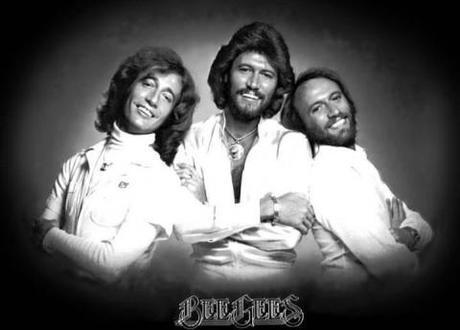
Robin Gibb, seen here with his brothers at the height of The Bee Gees' fame, has died. Photo credit: Lorenzana 777, http://de.fotopedia.com/items/flickr-1382115823
Robin Gibb, of the legendary disc-era group The Bee Gees, died on Sunday, May 20, after a long battle with cancer of the colon and liver. He was 62.
Gibb’s health had been failing for the last several years, declining when unrelated surgery on his bowel 18 months ago uncovered a tumour. In April, he fell into a coma after contracting pneumonia and his chances of survival were placed at 10 percent. He recovered then, but soon fell ill again.
Gibb, who was made a CBE in 2002 along with his brothers, was instrumental to the sound and look of the 1970s disco era, with such falsetto-heavy hits as “How Deep Is Your Love”, “Stayin’ Alive”, and “Night Fever”. Later, The Bee Gees wrote hits for singers as diverse as Dolly Parton, Celine Dion, and Destiny’s Child.
He is survived by his second wife, Dwina, and their son Robin-John; his children Spencer and Melissa from his first marriage; his daughter Snow Robin; and his brother, Barry. His twin brother and fellow Bee Gee, Maurice, died in 2003 from a heart attack following bowel surgery; his younger brother, Andy Gibb, died in 1988 at the age of 30, from heart failure.
Remembering Robin: Twitter reacts to Gibb’s death
Becoming a Bee Gee
Gibb and his twin Maurice were born on the Isle of Man to English parents on December 22, 1949, three years after their brother Barry. They were encouraged to form a singing act early on by their father, Hugh, a band leader, and mother Barbra, a former singer. In 1958, the family moved to Brisbane, Australia, where the fraternal trio took the name The Bee Gees, an abbreviation of Brothers Gibb, signed to the Australian label Festival Records and released a series of singles written by Barry. By the time Robin and Maurice were 17, the band had a number one hit with “Massachusetts”. In 1967, the group moved to England, The Guardian reported, because they were “well aware of the pop-music boom happening in Britain” and wanted to tap into it.
Saturday Night Fever brings major stardom
In 1977, The Bee Gees’ manager Robert Stigwood asked them to write some songs for a film he was producing: Saturday Night Fever starring John Travolta. This would lead to the band’s most famous, enduring songs, written in little over a weekend; The Telegraph reported that “with their trademark falsetto close harmonies, the trio helped turn disco into a global phenomenon”. The Rock and Roll Hall of Fame reported that in this period they “dominated dance floors and airwaves. With their matching white suits, soaring high harmonies and polished, radio-friendly records, they remain one of the essential touchstones to that ultra-commercial era.”
Strong family ties
The Guardian quoted Gibb saying of his fraternal bandmates: “We wanted to make music all our lives and it evolved to a point where the only people who could understand that were the three of us […] We didn’t feel comfortable with anybody but ourselves. The three of us were like one person.” As the group became more famous, however, “the influence of fame, drugs and money had had a corrosive effect on fraternal harmony”.
Robin Gibb, Labour supporter?
The Telegraph highlight Gibb’s political ties, and the light-hearted touch the Labour supporter brought to politics, saying Gibb “raised eyebrows in 2008 when he suggested then Prime Minister Gordon Brown let his hair down after a hard day running the country by turning on the stereo and blasting out Bee Gees disco classics.”
Battle with illness
Gibb’s diagnosis of cancer seemed to bring his life of fame and wealth into sharp focus. The Daily Mail report that “after finding worldwide success, Gibb admitted earlier this year, in one of his last interviews, that he felt his illness was ‘karma’ for his fame”. The Daily Mail also quote Gibb’s reflections on his mortality after his twin brother’s death: “Now I know how precious time is and you can’t put it in the bank. I intend to make the most of every single second that I’ve got left”.
The Bee Gees’ influence
The Bee Gees are among the most selling groups of all time, with hits stretching across five decades, the BBC reported; such was their influence that they were inducted into both the Rock and Roll and Songwriters’ Hall of Fame. Broadcaster Paul Gambaccini described Robin Gibb as “one of the major figures in the history of British music”, and claimed that as a songwriting unit, the brothers were second only to Paul McCartney and John Lennon. He continued, “What must also be said is Robin had one of the best white soul voices ever.”
‘Stayin’ Alive’, by the Bee Gees

